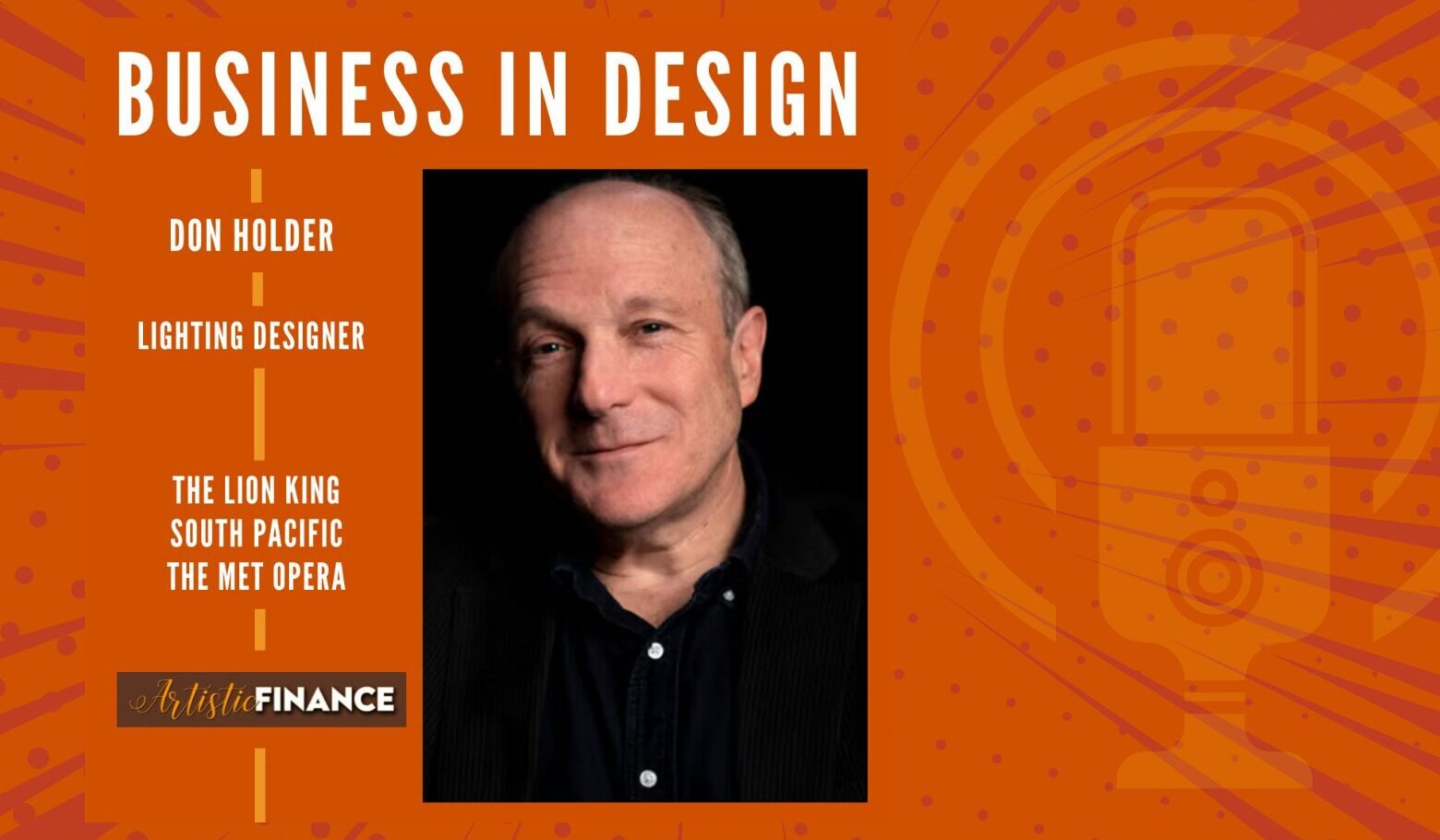Don Holder: The Business of Lighting Design

In this episode of Artistic Finance, host Ethan Steimel sits down with renowned lighting designer Don Holder to discuss his journey in the theater industry, from his early days as an electrician to designing for Broadway hits like The Lion King and Spider-Man: Turn Off the Dark. Don shares invaluable career advice for aspiring designers, insights into financial management as a freelancer, and the benefits of structuring a business as a C-corp. Below is an insight into some of the topics covered in this Podcast.
How did Don Holder transition from being an electrician to a Broadway lighting designer?
Don Holder began his career working as an electrician and technical director before transitioning into lighting design. He credits his experience in these roles with providing him a pragmatic perspective on the technical aspects of lighting. His knowledge of how to physically mount and operate lighting equipment gave him an edge when he moved into design. He advises aspiring lighting designers to gain hands-on experience as electricians to understand the fundamentals of stage lighting and better communicate with technicians. Holder also emphasized that while this experience can sometimes limit creative impulses due to practical constraints, it ultimately helps designers make informed decisions that maximize efficiency and artistic impact.
What advice does Don Holder have for young designers aiming to work on Broadway?
Holder emphasizes that there is no clear-cut path to Broadway. Instead of targeting Broadway specifically, he encourages young designers to focus on developing their craft, collaborating with talented people, and taking advantage of opportunities as they come. He believes that building strong artistic relationships and refining design skills are the most critical steps. Rather than setting rigid career timelines, he advises young designers to engage in meaningful projects that could organically lead to Broadway work. Success in theater, according to Holder, is often about being in the right place at the right time and being prepared when an opportunity arises.
How did Don Holder manage his finances at the start of his career, and what lessons did he learn?
Early in his career, Holder struggled with financial instability, particularly in managing taxes and saving money. He often found himself short on funds when tax season arrived, leading him to consider alternative careers like becoming an air traffic controller or working for Con Edison. Over time, he learned the importance of financial discipline and planning. One of the best financial decisions he made was establishing a C Corporation (C-Corp), which provided tax advantages, retirement benefits, and liability protection. He also emphasized the value of working with a financial advisor to navigate the complexities of freelance income and long-term financial planning.
Why did Don Holder establish a C Corporation, and what benefits has it provided?
Holder formed a C-Corp in 1993 when he was hired for an architectural lighting project that required substantial liability insurance. The corporation not only helped him secure that project but also provided long-term financial benefits. The C-Corp allowed him to set up retirement accounts with significant tax advantages, hire assistants and associates efficiently, and better manage his income. It also protected him from personal liability on large projects. Through his corporation, he was able to negotiate contracts that ensured his assistants received union benefits, demonstrating how incorporation can be a powerful tool for freelancers in the entertainment industry.
What financial advice does Don Holder offer to freelancers in the arts?
Holder’s primary financial advice is to “pay yourself first.” He encourages freelancers to consistently set aside money for savings and retirement, no matter how small the contribution. He believes financial planning should be an integral part of a creative career, emphasizing that accumulating savings over time can provide financial stability. He also stresses the importance of consulting professionals, such as accountants and financial advisors, to navigate tax laws, investments, and long-term financial security. He highlights that while the arts industry does not always provide financial education, creatives should actively seek knowledge about managing their finances to ensure long-term success.
Key Takeaways from the Episode
- Hands-on Experience is Crucial
Don Holder advises young designers to start as electricians to gain technical knowledge and improve communication with technicians, which ultimately enhances their design skills. - No Clear Path to Broadway
Success in theater comes from building strong artistic relationships, honing one’s craft, and being ready when opportunities arise, rather than strictly aiming for Broadway. - Financial Planning is Essential
Early financial struggles taught Holder the importance of tax management and savings, reinforcing the need for financial discipline among freelancers. - Benefits of a C-Corp for Freelancers
Establishing a C Corporation provided Holder with tax advantages, liability protection, and a structured way to manage income, savings, and retirement. - Pay Yourself First
Holder emphasizes setting aside savings consistently, seeking financial advice, and making financial literacy a priority for long-term career stability in the arts.
Listen to this Episode on:
Website / Spotify / Apple Podcasts / YouTube
This episode of the Artistic Finance podcast is hosted by Ethan Steimel.
Back to Home
Editor's Note: At StageLync, an international platform for the performing arts, we celebrate the diversity of our writers' backgrounds. We recognize and support their choice to use either American or British English in their articles, respecting their individual preferences and origins. This policy allows us to embrace a wide range of linguistic expressions, enriching our content and reflecting the global nature of our community.
🎧 Join us on the StageLync Podcast for inspiring stories from the world of performing arts! Tune in to hear from the creative minds who bring magic to life, both onstage and behind the scenes. 🎙️ 👉 Listen now!
